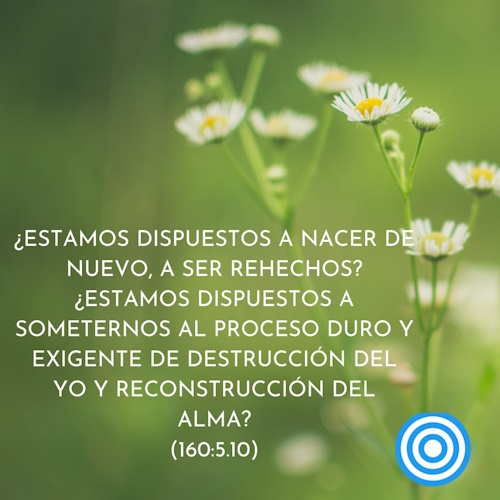© 2022 María José Sánchez Santamaría
© 2022 Urantia Association of Spain
¶ Located in our center

Many of us at school have learned to handle the compass, that curious device that allows us to create perfect circles. If the compass needle is well positioned, the other pole of the compass allows us to make beautiful and perfect drawings. But if the needle is not correctly positioned, the other pole of the compass will make sketchy and imperfect patterns.
In life, the same thing happens to us too: if we are located in our center, whatever we do, the result will be beautiful and pleasant to see.
At the III International Conference of Readers of The Urantia Book, in October, we had the opportunity to fine-tune our compass and place the needle in the right place, in our center. The moments of meditation and group prayer, plus the personal and group reflections, have helped us to be more connected with our inner source, something that always accompanies us everywhere and in all circumstances of life, good or bad. A source of peace, goodness and beauty that can change us, can make us different, better. Or in the terminology Jesus once used: it allows us to be “born again.” We are talking about a process of growth and change on a physical, emotional, mental and spiritual level that is not easy.
In The Urantia Book we find different episodes that show us the proper and highest focus that the Master had before the vicissitudes of life. He knew how to handle life centered on the divine will. Do you remember the episode of Jesus in Jerusalem, with his exalted brother Judah, and the serious problem that both suffered during the Jewish Passover ceremony?
If we dissect the episode, we can see how the “emotional kidnapping” that Judah suffered, with his mind clouded by an overflowing torrent of emotions, can cause us serious problems and disconnects us from our best essence. But at the same time we see how, faced with this same problem, Jesus does not allow himself to be swamped and carried away by emotions. He acts calm and patient.
They arrived at Jerusalem in due time and were on their way for a first visit to the temple, the very sight of which had stirred and thrilled Jude to the very depths of his soul (UB 128:6.5)
We can perfectly imagine a young Judah, an enthusiastic patriot, moved by the magnificent vision of Jerusalem.
. . .when they chanced to meet Lazarus of Bethany. While Jesus talked with Lazarus and sought to arrange for their joint celebration of the Passover, Jude started up real trouble for them all. Close at hand stood a Roman guard who made some improper remarks regarding a Jewish girl who was passing. Jude flushed with fiery indignation and was not slow in expressing his resentment of such an impropriety directly to and within hearing of the soldier. Now the Roman legionnaires were very sensitive to anything bordering on Jewish disrespect; so the guard promptly placed Jude under arrest. (UB 128:6.5)
After a fit of rage, Judah hurls serious insults at the soldier… resulting in his arrest. And to make matters worse, he continues to insult the Romans as they take him to prison:
This was too much for the young patriot, and before Jesus could caution him by a warning glance, he had delivered himself of a voluble denunciation of pent-up anti-Roman feelings, all of which only made a bad matter worse. Jude, with Jesus by his side, was taken at once to the military prison. (UB 128:6.5)
By contrast, Jesus himself acted with great serenity seeking a solution to the arrest problem, a problem that could not be solved at the time. The two had to remain in jail while the Passover was celebrated in Jerusalem and were left without participating in the Temple ceremonies, as planned.
Jesus endeavored to obtain either an immediate hearing for Jude or else his release in time for the Passover celebration that evening, but he failed in these attempts. Since the next day was a “holy convocation” in Jerusalem, even the Romans would not presume to hear charges against a Jew. Accordingly, Jude remained in confinement until the morning of the second day after his arrest, and Jesus stayed at the prison with him. (UB 128:6.6)
How to solve this serious problem? The integrity and serenity of mind of Jesus manages to settle this cumbersome issue:
The morning following their second day in prison Jesus appeared before the military magistrate in behalf of Jude. By making apologies for his brother’s youth and by a further explanatory but judicious statement with reference to the provocative nature of the episode which had led up to the arrest of his brother, Jesus so handled the case that the magistrate expressed the opinion that the young Jew might have had some possible excuse for his violent outburst. (UB 128:6.7)
Imprisonment did not result in Jesus developing an attitude of defeat, since he could have reacted by sinking into his state of mind and, as a consequence, he could have found himself without the strength to solve the imprisonment. He also doesn’t get carried away by anger and fury, like his little brother did. Surprisingly for us, he knows how to handle his mind brilliantly and use the right words to make the judge merciful.
With that same serenity of mind, Jesus conducted himself in relation to his family in Nazareth. The exaltation of spirits did not cloud his mind and he knew how to be patient, waiting for the emotions to calm down before having a long conversation with his brother, once at home. As fathers or mothers, we can put ourselves in Jesus’ shoes and admire his integrity in the face of this serious problem with his brother/son Judas. He knew how to wait up to three weeks so that Judah’s mind could understand and comprehend the seriousness of his behavior, so that he could really hear what Jesus wanted to communicate to him:
Jesus did not tell the family about his young brother’s arrest at Jerusalem, but he had a long talk with Jude about this episode some three weeks after their return. After this talk with Jesus Jude himself told the family. He never forgot the patience and forbearance his brother-father manifested throughout the whole of this trying experience. (UB 128:6.8)
What admirable use of mind and language we find in this family episode, where two ways of acting in life are very clearly opposed. On the one hand, we see the damage that acting can cause us when we cannot reason because our mind is flooded by uncontrollable emotions, when our “cerebral amygdala” is directing our behavior. On the contrary, we see how a serious problem can be solved when we act with a serene spirit and dialogue, when our mind is flooded with peace and patience, like the mind of that young Jesus of Nazareth. A mind consecrated to doing the will of the Father, a mind focused on its Center.
Let’s see another very curious and striking passage. Another passage where overflowing emotions also caused suffering:
About halfway up the hillside on a small, relatively level spot was the cemetery of the little village of Kheresa. As Jesus and his associates passed near this burial ground, a lunatic who lived in these hillside caverns rushed up to them. This demented man was well known about these parts, having onetime been bound with fetters and chains and confined in one of the grottoes. Long since he had broken his shackles and now roamed at will among the tombs and abandoned sepulchres.
This man, whose name was Amos, was afflicted with a periodic form of insanity. There were considerable spells when he would find some clothing and deport himself fairly well among his fellows. During one of these lucid intervals he had gone over to Bethsaida, where he heard the preaching of Jesus and the apostles, and at that time had become a halfhearted believer in the gospel of the kingdom. But soon a stormy phase of his trouble appeared, and he fled to the tombs, where he moaned, cried out aloud, and so conducted himself as to terrorize all who chanced to meet him.
When Amos recognized Jesus, he fell down at his feet and exclaimed: “I know you, Jesus, but I am possessed of many devils, and I beseech that you will not torment me.” This man truly believed that his periodic mental affliction was due to the fact that, at such times, evil or unclean spirits entered into him and dominated his mind and body. His troubles were mostly emotional—his brain was not grossly diseased.
Jesus, looking down upon the man crouching like an animal at his feet, reached down and, taking him by the hand, stood him up and said to him: “Amos, you are not possessed of a devil; you have already heard the good news that you are a son of God. I command you to come out of this spell.” And when Amos heard Jesus speak these words, there occurred such a transformation in his intellect that he was immediately restored to his right mind and the normal control of his emotions. (UB 151:6.2-5)

In this passage from Queresa’s lunatic, its protagonist lives revealingly in a cemetery, a place of death. There he shouts, he is naked, he harms himself, he is completely out of his mind. He has lost control, he is overwhelmed, scattered. He breaks down inside and fights his ghosts.
Faced with this terrible situation, is there a way out? In life we face countless adverse situations and ask ourselves: will I get out of this? Will I get over this crisis? Will this bad streak pass?
The solution is given by Christ, capable of seeing deeply. Only our original nature can ensure that our will is not confused and divided, wanting one thing on one side and another on the other. Only if we live from the BEING can we feel at home always and anywhere.
Because here we have on the one hand the lunatic, who asks Jesus to leave him and not torment him. “Go away, go away, leave me alone!” he would say. But on the other hand, Amos recognized Jesus, approached and knelt before him, thus also begging for his help.
Jesus, who is the Light of the world, sees us to the depths of our being. He knows our demons or ghosts and speaks to them with authority, telling the truth: you are a child of God, rise up, come out of your collapse. Everything can be put together and return to its place. It is possible to recover and turn the page. Jesus is our great support in this matter, the inner teacher who makes change possible.
The lunatic from Queresa dressed and in his right mind must have been an unforgettable vision for the people of Queresa. He seemed like a different person, they could barely recognize him. What has happened to their chains and their frightful screams? “So it was such a man, almost handsome, who was hiding behind the grotesque we were used to!” they would think. Even in the most vile and despicable forms (rapists, pedophiles…) there is always a man or a woman like this: dignified, beautiful, sensible…
No matter how horrendous the evil may be and no matter how deep the pit into which it has fallen, there is always, always the possibility of a different Queresa. Because Queresa could have gone down in history as a synonym for mental alienation and diabolical possession. But Queresa, however, can and should evoke the recovery of common sense, the triumph of reason and the victory of mental harmony.
What happens to us now, in our world, where mental illness abounds? What sense does a daily reality have in which emotionality is often overwhelmed? Addictive video games that do not promote reasoning but viscerality and a high dose of dopamine in our brain. Constant television images of damage, of possible problems, which alter our mood, but where analysis, reasoning, causes are not offered and, therefore, there is no talk of better solutions and alternatives for our world. Unpleasant or boring situations, solved by constantly looking at a consoling and stimulating mobile phone screen, diving into social networks. We have an addiction, quite large, to emotionality.
And where disease and overflow abound, it is reasonable to wonder if it is society that makes us sick, that brings out the worst in us. It is not that we get sick because we were born with a factory defect, but that this problem unfolds and devastates us because we suffer intolerable pressure, systematic injustice.
“I was brainless, pure emotion, and this man has brought me back to my senses.” That was more or less what that furious madman said when he recounted his recovery. “I was down and he pulled me out of the hole. I was dumped in a ditch and it put me back on the road. He lived in the most absolute disorder and with his words he returned me to myself ».
Said Jesus to Amos: “Forget not that you are a son of God. Return to your own people and show them what great things God has done for you.” (UB 151:6.8)

That Man who restored a poor lunatic to sanity in Queresa, that Man exists. That Man is by our side, willing to help us, to help us bring out our best version, to follow his example of mind-emotion balance in our daily lives. To live like a beautiful compass, focused on our Being.
Are we willing to be born again? to be remade? Are we willing to be subject to this terrible and testing process of self-destruction and soul reconstruction? Has not the Master said: “Whoso would save his life must lose it. Think not that I have come to bring peace but rather a soul struggle”? (UB 160:5.10)
Nobody said that life was easy, but here we are… and we are accompanied by the best Travel Companion.
True, after we pay the price of dedication to the Father’s will, we do experience great peace provided we continue to walk in these spiritual paths of consecrated living. (UB 160:5.10)